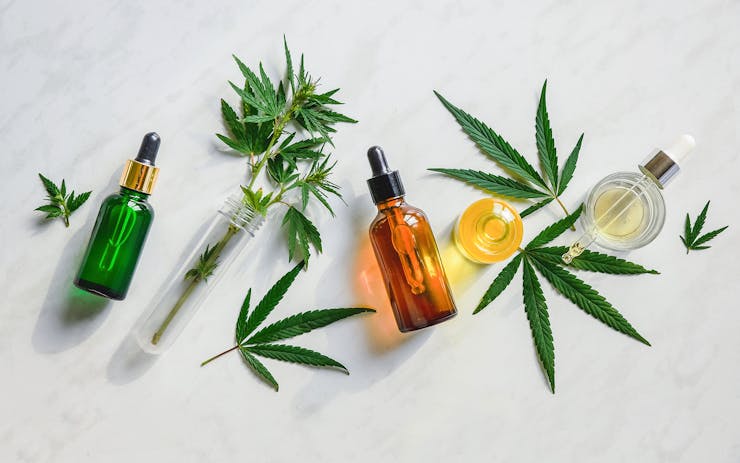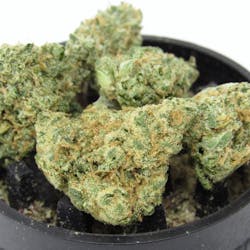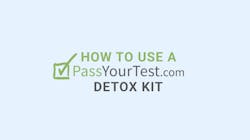What exactly is CBD (cannabidiol) oil and what can it do? What doesn’t it do? You’re likely here because someone told you to try CBD oil for pain, insomnia, anxiety, cancer, or another medical condition. Or you may be interested in trying it for everyday wellness, like a daily supplement.
We’re glad you’re here, arming yourself with information before diving head-first into the world of CBD, where misinformation and dubious claims swarm around unregulated products. CBD products can offer excellent relief, but one essential takeaway here is this:Not all CBD oils are created equal.
In this guide, you’ll come to understand the many forms of CBD oil and their differences. By the end, you should feel equipped and ready to find a clean CBD oil with reliable potency.
What is CBD oil?
CBD, or cannabidiol, is one of many chemical compounds (also called cannabinoids) produced by cannabis. CBD oil simply refers to an extract of cannabis or hemp that is formulated to contain high levels of CBD, and may capture varying levels of other plant compounds.
Products containing only CBD are non-intoxicating, unlike THC-rich products which cause the high commonly associated with cannabis.
Products containing only CBD are non-intoxicating, unlike THC-rich products which cause the high commonly associated with cannabis. This makes CBD a popular remedy among consumers looking for clear-headed relief of their symptoms. (Which symptoms, you ask? More on that below).
“CBD oil” is really a catch-all term used to describe CBD extracts more generally. While shopping for CBD oil, you’re likely to come across many different forms. The following products are some of the most popular forms of CBD oil.
- CBD tinctures are liquid extracts that are applied under the tongue, where CBD is absorbed and enters the bloodstream. They typically come in a glass bottle with a dropper for dosing built into the lid.
- CBD capsules are filled with oil and swallowed like a traditional supplement. These are packaged like bottles of vitamins or supplements, containing gelcaps filled with a golden oil.
- CBD Rick Simpson Oil (RSO) refers to an alcohol-based extract that can be ingested or applied to the skin. It’s commonly packaged in a plastic plunger or applicator.
- CBD vape oil may refer to either pre-filled oil cartridges that attach to vape batteries or vape juice used in e-cigarettes.
- Dabbable CBD oil includes CBD-rich butane hash oil, live resins, rosin, and other forms used for a somewhat elaborate flash vaporization process known as “dabbing.” We wouldn’t suggest beginners start here, but we mention it so you understand what you are (or aren’t!) shopping for at your next visit to the cannabis shop.
For more information on which forms of CBD most reliably deliver their advertised dose, check out the results of Leafly’s CBD investigation.
What are the effects and benefits of CBD oil?
The first question on your mind right now might be,will CBD oil get me high? The short answer is no, most will not. But that can depend on where you’re buying your CBD oil.
On its own, CBD is a non-impairing compound. Any CBD products you purchase online or at retailers like grocery and drug stores are required to contain less than 0.3% THC; that trace amount of THC will not result in detectable euphoric effects.
However, when shopping at your local cannabis shop, it’s important to note how much CBD and THC are in a product. Products that contain both CBD and THC are increasingly common at cannabis retailers and suit the needs of many consumers. But if you’re looking to avoid any noticeable high, consult your budtender and read the label of the product you’ve selected: Generally speaking, products with less than 1% of THC (or less than 2mg of THC) will not get you stoned, but it really varies from person to person.
CBD oil may not get you high, but that doesn’t mean it’s completely undetectable in your body. Depending on your dose, your unique biology, and how you consume it (e.g., tincture, lotion, vaporized oil, etc.), CBD oil can have a range of subtle effects including physical relaxation, stress relief, or a slightly alerting or sedating effect (more on that here).
The most obvious effects of CBD oil should come in the form of symptom relief. Although research has yet to explore the full range of CBD’s utility, most people use CBD oil to manage symptoms related to:
But how effective is CBD oil at treating these conditions? Early studies and anecdotal reports are promising, but due to strict federal laws around cannabis, controlled clinical trials are lacking. So far, the safety profile of CBD appears to be very high, but it’s also important for consumers to take caution with potential drug interactions or products with questionable ingredients.
Finding the best CBD oil for you
Because CBD oil is not yet regulated, it’s up to the consumer to discern between high-quality concentrates and snake oil. As a general rule, we recommend purchasing organic, third-party tested oils sourced from domestically grown cannabis.
The wide variety of therapeutic compounds found in full-spectrum CBD oils make them popular among consumers wanting all the helpful ingredients they can get.
First, there are three distinct types of CBD oil you should know:
- Full-spectrum CBDoil contains the full array of compounds produced by its source plant (CBD, THC, and other cannabinoids and terpenes).
- Broad-spectrum CBD oil contains a wide array of the compounds produced by its source plant, but THC is removed.
- CBD isolate contains only CBD—all other compounds have been removed.
The wide variety of therapeutic compounds found in full-spectrum CBD oils make them popular among consumers wanting all the helpful ingredients they can get. Broad-spectrum CBD oil or CBD isolate, however, would be a good choice for those wanting to avoid even trace amounts of THC due to, let’s say, an upcoming drug test.

CBD oil can be made from either hemp or traditional cannabis (think smokeable dried buds), as both produce CBD in their resinous glands. There a few key differences and characteristics worth noting:
- Due to differences in legality, hemp-derived products are far more accessible and widely available for purchase online. Cannabis-derived CBD oil and similar products are only available at cannabis shops in areas with legal cannabis.
- Hemp expresses fewer resin glands than traditional cannabis with a higher THC content, so more plant material is required to process CBD oil derived from hemp. Since hemp more readily absorbs soil contaminants in a process called bioaccumulation, its extracts have a higher likelihood of concentrating residual heavy metals.
- Hemp is also more limited in its chemical diversity, which could potentially result in a less therapeutically potent product.
That’s not to say that there aren’t high-quality, organic, reliable, and clean hemp-derived CBD oils and other products, even in an unregulated era. We’re starting to see an uptick in producers dedicated to creating safe, effective, reliable hemp-derived CBD oils.
So how do you get your hands on the good stuff? Leafly’s full guide to buying reliable CBD products is a great place to start.





